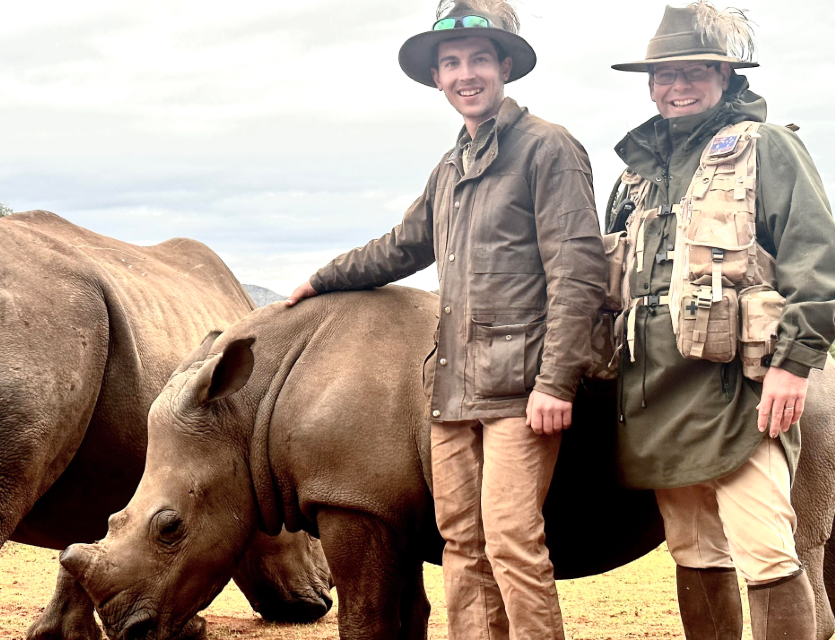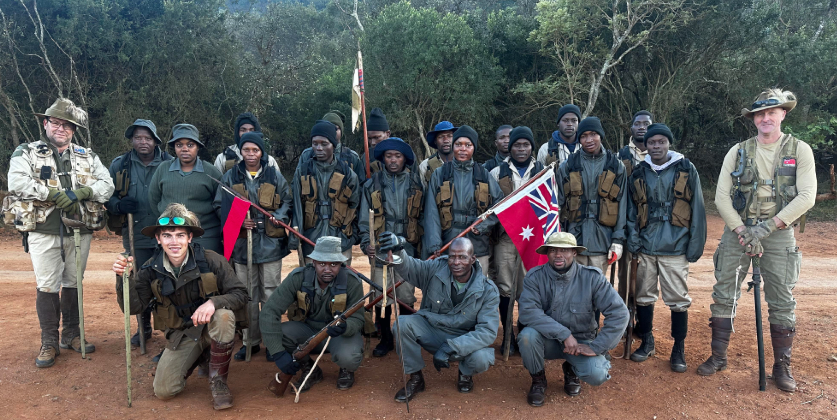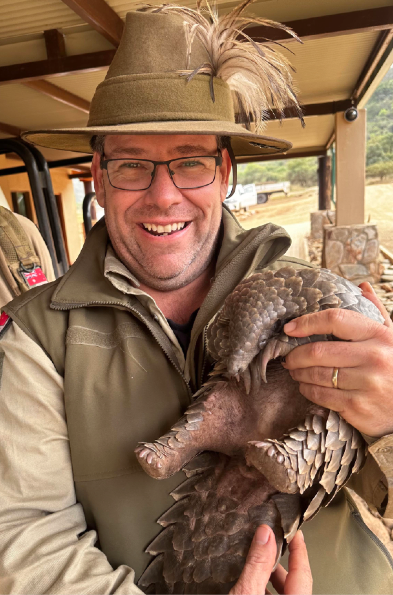Joe and Wes with a young Rhino.
Jugiong’s Wes Leseberg is a fine horseman. Been on their back since he first learnt how to walk.
Wes spent around 20 years in the NSW Police Force and has more recently transitioned to an Operational Officer with the Rural Fire Service.
However, during this time, he has always held a strong passion for military history and conservationism.
He is the current Chairman of the 7th Gundagai Light horse Troop.
Wes flew to South Africa from Sydney last year and then after further connecting transport, arrived at Careful Wild which is a Rhino sanctuary.
Wes’ riding skills have become widespread and known. He played Sergeant Parry in the Australian epic, The Legend of Ben Hall. This time around though, it was real life for him and fellow local Joe Roberts. They embarked on an adventure with the duo spending several weeks teaching locals how to break in horses and ride them, as well as bush skills such as preparing for extended stays in the scrub where you have to take everything for yourself and your horse to maintain safety.
Wes and Joe (kneeling) with their patrol group.
Wes said, “Most of the Rhino’s who end up there are the offspring of mothers who have been poached. Many of them come in as orphaned babies from Kruger Park. They also have a lot of other animals on the reserve, including Pangolins, which are sought after for the scales on their back. They have other animals too, with Lions, Giraffes, Wildebeest and the plains type animals like Warthogs and Springboks. You always have Baboons that wander through.”
Wes and Joe were there to help train the local rangers who he said often have a high turnover.
“It’s not an easy job. They spend a lot of time out in the bush, they work long hours. Our main role is to teach them how to ride and how to handle their horses both on top, and on the ground. Some of these blokes may live in a village but they aren’t necessarily bushmen. No different from here, people taking on a job.”
“The South African Bush isn’t that different from here, hot and dry. You need to know where you are going to get water and food. It’s about supply. Just like the Light horse 100 years ago they need to take everything with them. Long distance patrols for three or four days with pack horses.”
“There’s another reserve being set up at the moment with thirty five kilometres between the two. You can really tell the difference when you left our reserve. A few cows with herdsman, there weren’t many game animals.”
One problem which exacerbates the situation is the poaching that goes on to feed local families, separate to the crime groups that poach the Rhinos. Some poaching saves lives and feeds locals, others poaching is purely for greed.
Wes highlighted the disparity of the have and have nots in the areas, with some areas in the bush having dirt floors in the homes and other homes in the more urban areas having razor wire to protect their compounds.
Wes with a Pangolin.
“Forget Council regulations, out of nessessity they will build what they can from whatever materials they have.” Wes said, “The patrols vary, some are armed and some are unarmed. They go through firearm training courses, it depends on the intel. We also had to blend in how to dismount and what tactics to use if you came in to contact with a poacher. They need to learn patrol formations including how to move in large groups.”
When asked if he would go back, Wes was keen on the idea, however had just taken another role on with the RFS.
“The opportunity is there, but I have started a new job and won’t be able to go back anytime soon. We broke in 7 horses while we were there. We spent a lot of time chasing illegal gold miners. There’s three gold mines in the area. You have groups of 30-40 people who can come in at night and they break in and steal the gold. We are trying to get the area set up for another sanctuary. The thieves break in through ventilation shafts and steal the explosives so they can use them themselves underground. It’s a different world.”



